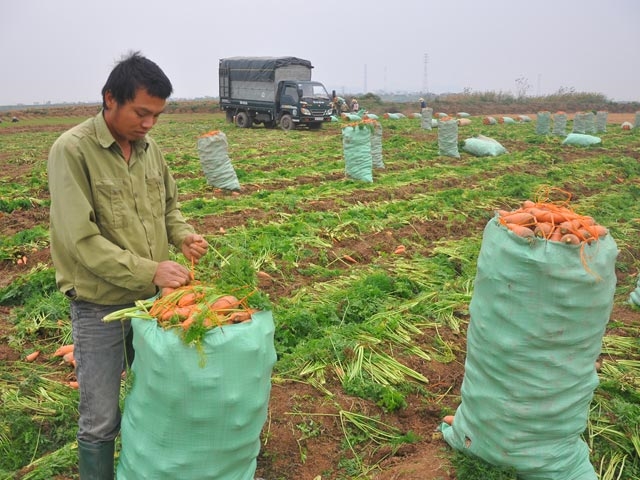 Society
Society

Renewing policies and mechanisms is one way to help Vietnamese farmers adapt to the Trans-Pacific Partnership (TPP) when it takes effect, heard a workshop held in Hà Nội on Thursday.
 |
| Farmers harvest carrots in Gia Bình District, Bắc NInh Province. Renewing policies and mechanisms is one way to help Vietnamese farmers adapt to the Trans-Pacific Partnership (TPP) when it takes effect, heard a workshop held in Hà Nội on Thursday. – Photo danviet.vn |
HÀ NỘI – Renewing policies and mechanisms is one way to help Vietnamese farmers adapt to the Trans-Pacific Partnership (TPP) when it takes effect, heard a workshop held in Hà Nội on Thursday.
The event, held by the Vietnamese Farmers Association, looked into challenges facing Vietnamese farmers and sought measures to help them benefit from the TPP.
It brought together more than 100 experts from ministries and agencies as well as scientists and farmers.
Participants agreed that while the TPP will open up large markets for Việt Nam’s farm produce and boost investment in Việt Nam, more than 10 million Vietnamese farm households are anticipated to face difficulties due to their small scale operations.
Farmers are the most vulnerable to outside competition due to their lack of knowledge and low competitiveness, experts said, noting that animal husbandry farmers in particular are likely to be at a disadvantage compared to their peers in other countries with modern production processes.
Experts said the most important thing at present was raising awareness of farmers about the opportunities and challenges of the TPP, so that they will aim to increase productivity and product quality.
Farmer’s associations at all levels need to connect farmers with businesses to sell products, experts recommended.
Vice Chairman of the Vietnamese Farmers Association, Lều Vũ Điều, said it was important to raise production capacity and trade promotions for farmers as farmers as they often depended on businesses to sell their products.
The association would instruct its branches in localities to work with authorities, scientists and businesses to form a value chain and build strong links between them and farmers, he said.
Chief Representative of the Food and Agriculture Organisation of the UN in Việt Nam, Jong-ha Bae, said Việt Nam was expected to benefit the most from the TPP of the 12 member economies.
However, Việt Nam’s agriculture would face fierce competition from foreign manufacturers when the tariff and non-tariff barriers are reduced and eliminated, he added.
He suggested setting up a mechanism to attract private investment in agriculture and urged the country to improve food quality and safety. — VNS




